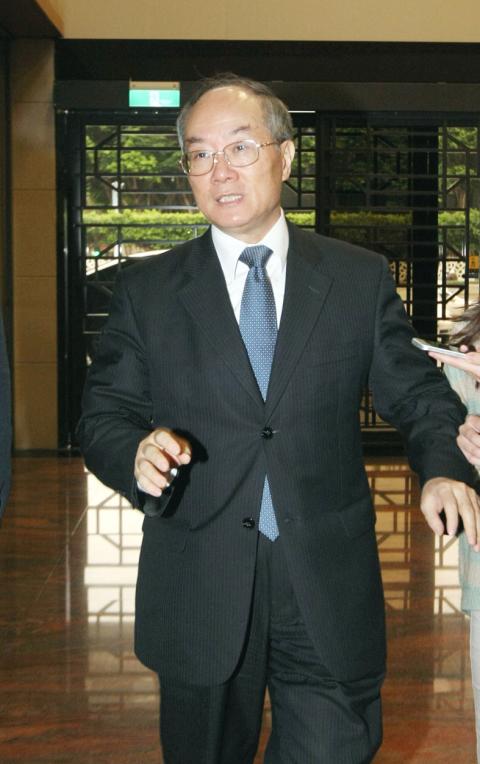Prosecutor-General Huang Shih-ming (黃世銘) yesterday announced he would step down after the Taipei District Court hours earlier found him guilty and sentenced him to 14 months in prison for leaking confidential information to President Ma Ying-jeou (馬英九) about a controversial probe into claims of influence peddling last year.
Taipei District Court spokesperson Lai Chien-yi (賴劍毅) told a press conference that Huang was charged with three counts of violating the Communication Security and Surveillance Act (通訊保障及監察法) and leaking classified information in violation of the Criminal Code, and that the district court had applied the heavier punishment — under the Communication Security and Surveillance Act — to convict Huang.
Lai said Huang was sentenced to five months, five months and six months respectively for the three violations, and that he would have to serve one year and two months in prison.

Photo: CNA
Huang is the first prosecutor-general to be indicted and convicted in the nation’s history.
He can appeal the ruling to the Taiwan High Court or pay a fine of NT$420,000 instead of serving the sentence.
Lai said Huang knew an investigation into allegations that funds were embezzled from Formosa Telecom Investment Co (全民電通) was still ongoing, but he broke the law when he briefed Ma on Aug. 31 last year. He gave Ma information gathered through a wiretap that Legislative Speaker Wang Jin-pyng (王金平) had spoken with then-minister of justice Tseng Yung-fu (曾勇夫) and Taiwan High Prosecutors’ Office Head Prosecutor Chen Shou-huang (陳守煌) in an attempt to dissuade a Taiwan High Prosecutors’ Office prosecutor from seeking an appeal in a breach of trust case against Democratic Progressive Party Legislator Ker Chien-ming (柯建銘).
Huang also provided Ma a written report on the investigation on that night, he added.
On Sept. 4, Huang also briefed Premier Jiang Yi-huah (江宜樺) on the probe and provided him with a similar written report, Lai said.
The Special Investigation Division (SID) then held a press conference on Sept. 6 under Huang’s direction, where the SID released the tapped telephone conversations to the media, Lai said.
The court said that Huang had illegally leaked confidential information on three occasions.
Huang yesterday afternoon proclaimed his innocence and said in a statement that he felt deep regret about the ruling.
He said it was hard to believe that influence peddlers had not been punished, “while the people who uncovered the scandal were seriously punished.”
He added that he had made every effort to prevent politics from interfering in the judiciary.
Huang said he intended to keep his promise that he would resign if convicted in the first trial.
Deputy Minister of Justice Chen Ming-tang (陳明堂) said the ministry respected the district court’s ruling and Huang’s decision to resign.
Additional reporting by AFP

MAKING WAVES: China’s maritime militia could become a nontraditional threat in war, clogging up shipping lanes to prevent US or Japanese intervention, a report said About 1,900 Chinese ships flying flags of convenience and fishing vessels that participated in China’s military exercises around Taiwan last month and in January have been listed for monitoring, Coast Guard Administration (CGA) Deputy Director-General Hsieh Ching-chin (謝慶欽) said yesterday. Following amendments to the Commercial Port Act (商港法) and the Law of Ships (船舶法) last month, the CGA can designate possible berthing areas or deny ports of call for vessels suspected of loitering around areas where undersea cables can be accessed, Oceans Affairs Council Minister Kuan Bi-ling (管碧玲) said. The list of suspected ships, originally 300, had risen to about 1,900 as

Japan’s strategic alliance with the US would collapse if Tokyo were to turn away from a conflict in Taiwan, Japanese Prime Minister Sanae Takaichi said yesterday, but distanced herself from previous comments that suggested a possible military response in such an event. Takaichi expressed her latest views on a nationally broadcast TV program late on Monday, where an opposition party leader criticized her for igniting tensions with China with the earlier remarks. Ties between Japan and China have sunk to the worst level in years after Takaichi said in November that a hypothetical Chinese attack on Taiwan could bring about a Japanese

Right-wing political scientist Laura Fernandez on Sunday won Costa Rica’s presidential election by a landslide, after promising to crack down on rising violence linked to the cocaine trade. Fernandez’s nearest rival, economist Alvaro Ramos, conceded defeat as results showed the ruling party far exceeding the threshold of 40 percent needed to avoid a runoff. With 94 percent of polling stations counted, the political heir of outgoing Costa Rican President Rodrigo Chaves had captured 48.3 percent of the vote compared with Ramos’ 33.4 percent, the Supreme Electoral Tribunal said. As soon as the first results were announced, members of Fernandez’s Sovereign People’s Party

MORE RESPONSIBILITY: Draftees would be expected to fight alongside professional soldiers, likely requiring the transformation of some training brigades into combat units The armed forces are to start incorporating new conscripts into combined arms brigades this year to enhance combat readiness, the Executive Yuan’s latest policy report said. The new policy would affect Taiwanese men entering the military for their compulsory service, which was extended to one year under reforms by then-president Tsai Ing-wen (蔡英文) in 2022. The conscripts would be trained to operate machine guns, uncrewed aerial vehicles, anti-tank guided missile launchers and Stinger air defense systems, the report said, adding that the basic training would be lengthened to eight weeks. After basic training, conscripts would be sorted into infantry battalions that would take